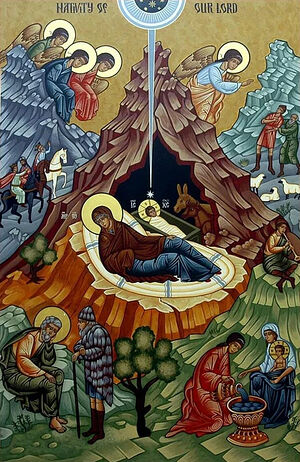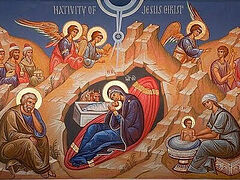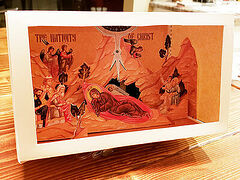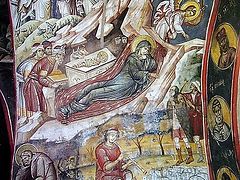 You know what a great joy, and how such a great assembly of people there be when they celebrate the birthday of an earthly king. How commanders and leaders as well as all the soldiers array themselves in silk garments, girdled in precious, shining gold belts, and hasten in brilliant grandeur to stand before the face of their king. For they know that the joy of the king will multiply when he sees the especial beauty of their adornment, and that the greater his gladness, the greater zeal will they show during his solemnities (the king as a man does not see the heart and judges others’ disposition toward him only according to externals. And therefore, whoever loves the king the most will dress for that day in bright clothing). Moreover, because they know that the king is often very generous on his birthday, and gives many alms either to his grandees or those of his house of who are poor and under his care, they try beforehand to fill his treasure chests with various riches so that when he wishes to give alms, he might be able to give them generously, and so that his desire to give alms would sooner dry up than his wealth. They do all of this with zeal, because they themselves hope to receive a great reward for it.
You know what a great joy, and how such a great assembly of people there be when they celebrate the birthday of an earthly king. How commanders and leaders as well as all the soldiers array themselves in silk garments, girdled in precious, shining gold belts, and hasten in brilliant grandeur to stand before the face of their king. For they know that the joy of the king will multiply when he sees the especial beauty of their adornment, and that the greater his gladness, the greater zeal will they show during his solemnities (the king as a man does not see the heart and judges others’ disposition toward him only according to externals. And therefore, whoever loves the king the most will dress for that day in bright clothing). Moreover, because they know that the king is often very generous on his birthday, and gives many alms either to his grandees or those of his house of who are poor and under his care, they try beforehand to fill his treasure chests with various riches so that when he wishes to give alms, he might be able to give them generously, and so that his desire to give alms would sooner dry up than his wealth. They do all of this with zeal, because they themselves hope to receive a great reward for it.
Brothers! If the sons of this age, for the sake of temporary honor, greet the birthday of their earthly king with such preparation, then how must we greet the birthday of our eternal King Jesus Christ, Who for our zeal toward Him will reward us not with temporary but eternal glory, and vouchsafe us the honor not of an earthly ruler that passes on to his successor, but of a heavenly kingdom, which has no successor? What shall be the reward about which the prophet speaks: Eye hath not seen, nor ear heard, neither have entered into the heart of man, the things which God hath prepared for them that love him (Is. 64:4; 1 Cor. 2:9)?
With what garments should we adorn ourselves? I say “ourselves”, that is, our souls. Because our King Christ does not demand grand clothing but a disposition of soul; He does not look upon the adornment of the body, but upon the hearts that serve Him; He does not marvel at the glitter of the corruptible belt girding our loins, but admires invincible chastity, which binds lusts with shame. Thus, let us take care to appear before Him tested in faith, adorned in mercy, well-ordered in the example of our lives. Whoever sincerely loves Christ, let him adorn himself brightly by the keeping of His commandments, so that He would see that we truly believe in Him—for we have appeared in such grandeur during His solemnities—and be all the more gladdened as He sees spiritual purity in us. Let us make our hearts chaste beforehand, let us cleanse our consciences, illumine our spirits, and in purity and incorruptibility let us greet the coming of the All-Holy Lord, so that the birthday of the One born of the Most Pure Virgin might be celebrated by His chaste servants. Whoever comes on that day impure and defiled does not honor the Nativity of Christ. Although such a person might be present at the Lord’s solemnities in body, in spirit he is far from the Savior. For the impure cannot associate with the holy, the miserly with the merciful, the corrupt with the virginal. And if such a person should enter into association with them, he will cause all the more insult because he does not know himself. Wishing to appear zealous he is in fact audacious, like the man in the Gospel who, when called to the wedding feast, dared to enter into the assembly of the holy without a wedding garment. And while one shone with righteousness, another shone with faith, and a third shone with chastity, he alone, having an impure conscience, aroused only terrible repugnance with his trembling amidst everyone’s brilliance. And the more brightly shone the sanctity of those righteous people there, the more obvious was the defilement of the sinner who perhaps would not have created such revulsion had he not appeared amongst the hosts of saints. Therefore the king’s servants bound him hand and foot and cast him into outer darkness—not only because he was a sinner, but because as a sinner he claimed the reward reserved for the holy (Mt. 22:11–13).
Thus, in greeting the Nativity of our Lord, let us purify ourselves, brothers, from all defilement of sin. Let us fill His treasury with various gifts, so that on this holy day there would be something to comfort strangers, relieve the sorrows of widows, and clothe the needy. For can it be good if in one and the same house there be one servant making merry in silk garments, while another desponds, wearing rough tunics, the former sating himself with food while the other goes hungry in the cold? And what effect will our prayer have when we ask to be delivered from the evil one, but we ourselves do not want to be merciful to our brothers? Let us emulate our Lord. If it pleases Him to make the poor, along with us, participants in heavenly grace, then why shouldn’t they participate with us in earthly riches? Brothers in the Mysteries should not be strangers to each other in in possessions. We more surely acquire intercessors before the Lord when we feed at our own expense those who will give thanks to God. The poor man who blesses the Lord brings benefit to the one through whose cooperation the name of our Lord and Savior is blessed. The reward of a benefactor is such that he alone shows mercy in his home, but in church he prays to the Lord through the lips of many; and what he would not have dared to asked of God he unexpectedly receives at the intercessions of the many. Glorifying such cooperation, our blessed apostle says: Ye also helping together by prayer for us, that for the gift bestowed upon us by the means of many persons thanks may be given by many on our behalf (2 Cor. 1:11); and in another passage: That the offering up of the Gentiles might be acceptable, being sanctified by the Holy Ghost (Rom. 15:16)! Amen.



